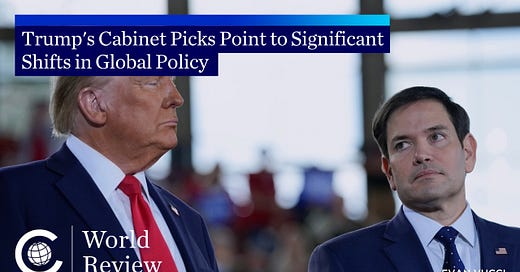World Review: Trump's Cabinet Picks Point to Significant Change in Global Policy
A brief synopsis of this week's show
Each Friday morning, I host a video podcast called “World Review with Ivo Daalder” where three journalists from major news outlets around the world join me in discussing the latest global news stories of the week.
This morning, November 15, was a special discussion on the Trump elections that I urge you to listen or watch in full. I was joined by Bobby Ghosh of Bloomberg, Nahal Toosi of Politico, and Giles Whittell of Tortoise Media.
“World Review is always fascinating. I love the fact that you can get journalists from around the world to participate since zoom is the medium.”
— A Subscriber to America Abroad
While I encourage you to watch or listen to the episode (and subscribe wherever you get your podcasts!), here are a few interesting things I took away from our discussion:
This week, Donald Trump began to take charge of the U.S. government by announcing his appointments to senior positions – the secretaries of state and defense, the directors of the CIA and the intelligence community, the attorney general, and his top homeland security officials. Many of these shocked Washington and the world. Bobby quoted an aphorism, that “when a clown moves into a palace, he doesn't become a king. The palace becomes a circus.” What all appointments have in common is their expressed loyalty to the president rather than their actual experience for the positions they were chosen. And once their nominations move to the Senate, they will set up a true test case for the new Republican majority there — and for the checks and balance at the center of America’s constitutional democracy. For many of these picks — whether Tulsi Gabbard for DNI, Pete Hegseth for the Pentagon, or Matt Gaetz for Justice — are well beyond the range of normal cabinet choices. New Senate Majority Leader John Thune will have his hands full. Can he marshal the 50 votes he needs for each confirmation to satisfy Trump or will he allow the Senate to defy the President’s wishes? Bobby suggested that we watch closely the 20 Republican Senators up for reelection in two years.
We next discussed how the world is reacting to Trump’s election and cabinet picks. There are some clear winners, Giles noted. Vladimir Putin is delighted; he has a sympathetic president in the Oval Office. He might even agree to a ceasefire to give Trump a win, enabling him to strengthen bonds with other countries and refuel for another round of fighting down the line. The Israeli government couldn’t be more pleased by the slew of appointments of people who strongly back their most extreme positions (eg, annexation of the West Bank) and a hardline towards Iran. Ukraine is a clear loser, likely facing the prospect of its major arms supplier conditioning aid on an agreement to end the fighting or facing a cutoff altogether. China may see more room for maneuver, especially in Europe and the Indo-Pacific if Trump pursue his skepticism towards alliances and raises tariffs on imports. India and other countries in the global south likely will see a more inward-looking America as strengthening their hands and influence. Even in many allied countries, political movements on the right will see Trump’s election as affirmation that their own anti-immigrant stance has political staying power.
As for Trump’s promise to deport millions of immigrants, his early appointments of Tom Homan as “border czar” and Steve Miller as homeland security advisor suggest that his oft-repeated calls for deportating millions of immigrants will be implemented. Nahal argued that these policies were unlikely to be just performative (as building the wall turned out to be in the first term). Even if Trump isn’t serious, the people he’s put in place have learned from their mistakes and will pursue anti-immigration policies without fail from day one. Even so, these policies may pose problems for Trump’s other priorities. Removing large numbers of immigrants from the labor force will increase employment pressures and likely raise wage costs—and thus inflation. Mexico would have to cooperate on deporting large numbers of people, but Trump is at the same time threatening to impose massive tariffs on imports from the southern neighbor. And who will pay for the implementation of the policy—the detention camps and actual deportations themselves? Trump as president has a lot of power, but he will need the cooperation of Congress and others to implement these policies.
That’s it for my quick takes of this week’s episode here on America Abroad. To get the full flavor, please listen to the episode itself.





